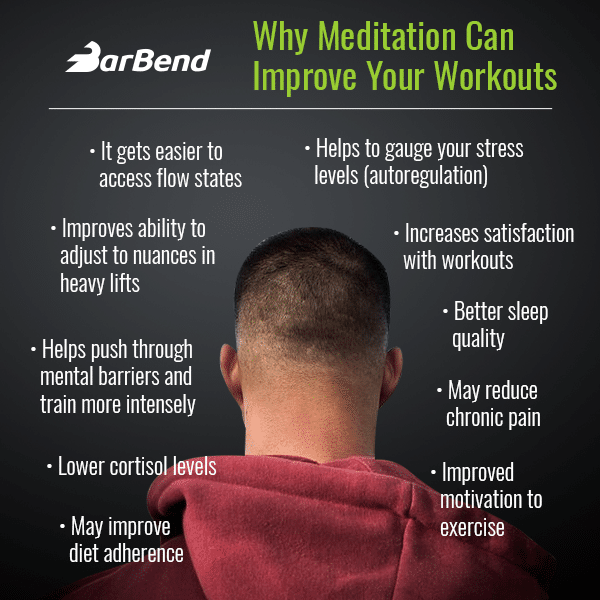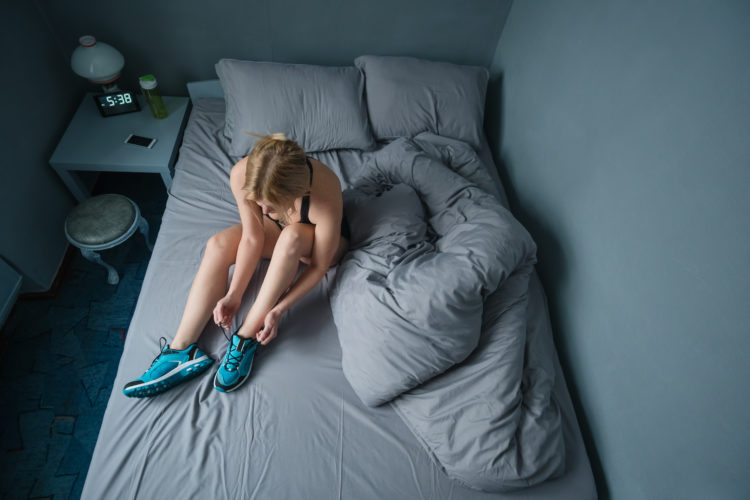Lifting heavy weights is healthy. It’s linked to an enormous variety of benefits , and it’s linked with a huge variety of benefits that include improved learning capacity, better cholesterol levels, lower inflammation, reduced risk of depression, fewer injuries, and stronger bones.
(And, sure, an aesthetically pleasing silhouette.)
But intense exercise jacks up your nervous system, or to put it more scientifically, it increases sympathetic tone — it puts the autonomic nervous system into more of a “fight or flight” state.
Getting “psyched” during a workout is a pretty reliable way to lift more weight (particularly when it’s accompanied by ungodly amounts of caffeine) but the agitation it produces can result in insomnia and low quality sleep. That means your recovery will suffer, your muscle gains and fat loss will be suboptimal, your hormones will take a hit, your mood can get disordered, your cortisol increases, cravings for unhealthy food are higher, and… well, you just don’t feel great.(1)(2)
For this article we’ve spoken to a psychiatrist and a psychologist to land on the best tips to help improve sleep quality so that you can recover as effectively as possible from your workouts.
[Related: Ways to Make Your System More Parasympathetic]
Editor’s Note: The content on BarBend is meant to be informative in nature, but it should not be taken as medical advice. When starting a new training regimen and/or diet, it is always a good idea to consult with a trusted medical professional. We are not a medical resource. The opinions and articles on this site are not intended for use as diagnosis, prevention, and/or treatment of health problems. They are not substitutes for consulting a qualified medical professional.

How Sleep Affects Athletic Performance
There are myriad ways that better quality sleep and more of it can improve muscle recovery.
An ideal workout depletes energy and breaks down muscle so thoroughly that the body realizes it needs more muscle than it’s got to be able to handle the stress. That’s why intense exercise boosts the production of growth hormone, which is important for stimulating the repair of muscles and bones. But while the body needs GH to optimize recovery and improver recovery time from injuries, 75 percent of the hormone’s production takes place during deep sleep – so inadequate sleep just isn’t going to cut it.(3)
Sleep and muscle growth are also connected by testosterone. Time and again, insomnia and poor quality sleep have been linked to decreased production of testosterone, which contributes to recovery and healthy amounts of muscle and body fat.(4)(5)
Your actual performance gets compromised from poor sleep as well. Various studies have linked high quality sleep to faster reaction times, faster sprints, better skill acquisition, greater endurance, and stronger lifts.(6)(7)(8)(9)(10)
1) Manage Your Sleep Hygiene
The term “sleep hygiene” refers to the habits and routines you have surrounding your bedtime. We’re not saying everyone needs to follow every single tip below, but if you keep having trouble falling asleep, these popular tactics might help:
- Avoid caffeine in the hours before bed. Some should avoid caffeine after breakfast, others aren’t bothered by caffeine at all. “As we get older, our ability to metabolize caffeine and get it out of our system slows down,” says Dr. Ronit Levy, a psychologist and clinical director at Bucks County Anxiety Center. “If it’s still in your system at bedtime, you’ll be exhausted but have a hard time falling asleep.”
- Start dimming the lights in your house or apartment in the hour before bed. Bright lights may interfere with the secretion of hormones that help you sleep.
- Only use your bed for sleep or sex. You may be able to read, but don’t spend time scrolling on your phone and definitely don’t work in bed. Maintaining these habits helps your mind to associate getting into bed with sleep and relaxation.
- Consider spending five or ten minutes stretching before bed, as it may help to shift the body into a more parasympathetic state.(11)
- “Not to be underestimated is reading before bed,” says Dr. David Rabin, a psychiatrist, neuroscientist, and co-founder of Apollo Neuroscience. “Not like a thriller, or something that will have you riveted to your feet, but some enjoyable fiction or something interesting and educational before bed can be great for helping the mind to wind down.”
- Go to sleep the same time every night and stick to the same routine as your day comes to a close. This helps to ingrain sleep as a habit.

2) Use Positive Self Talk
A lot of the time, people will lie in bed, close their eyes, and their minds will start moving at warp speed. What happened today, what will happen tomorrow, and the always popular “why can’t I sleep.”
“One of the biggest reasons we aren’t sleeping is because we have anxieties about sleeping,” says Dr. Rabin. “You have these thoughts over time and it becomes a positive feedback loop. Telling yourself I can sleep, rather than why can’t I sleep, changes your internal narrative and flips an emotional switch in the brain that brings you more into the mindset of achieving sleep.”
It might sound a little woo-woo, but shaping your internal narrative can indeed produce changes in your body. Which is why it’s also worth trying…

3) Meditation
Very solid, clinical, dry, scientific, didn’t-take-place-in-a-mountaintop-temple evidence has found that meditation can help to increase parasympathetic tone and reduce sympathetic tone — make you less “fight or flight” and more relaxed and ready to sleep. (Parasympathetic states are sometimes called “rest and digest” or “feed and breed” — and yes, digestion and sexual function also appear to improve when you’re less sympathetic.)(12)(13)(14)(15)
“Stretching, gentle yoga, and meditation are excellent the closer you get to bedtime,” adds Dr. Levy. “They help activate the part of your nervous system in charge of rest and relaxation, reduce stress, and reduce levels of the stress hormone cortisol. The less cortisol you have in your system, the easier it will be to fall and stay asleep.”
We’ve included some tips for meditation here, but focusing on the sensation of your breath leaving your nostrils is a very common tactic: “one” for in, “two” for out, “three” for in, up to ten breaths and starting over. (The mind wanders; it’s a lot harder than it sounds.) A full guide to meditating is beyond the scope of this article but Dr. Rabin firmly believes that focusing on your breath can help sleep to come when you’re lying in bed.
“Engaging in the breath pattern of a person who is asleep — roughly two to four breaths per minute, so one breath in and out every fifteen seconds — will put you to sleep in five to ten minutes almost every time,” he says. “It’s a technique to help control anxiety and get you into a more deescalated state, and it can radically improve your sleep.”

4) Stay Active
We know that we’re talking about recovering from workouts, but a lot of folks blast their nervous systems with intense exercise two or three times a week and stay inactive for the rest of the week. But regular activity has been shown to be crucial for improving sleep quality — and remember that quality is as important as quantity, here.(16)
“The best way to get deep sleep is being very active throughout the day,” says Dr. Rabin. “If you’re not active and you have restlessness when you go to bed, that’s when people get the least amount of deep sleep. There’s a lot to say about getting a lot of energy out during the day — getting it out of your body in a positive way will help to significantly improve your deep sleep.”
On days you’re not lifting heavy, consider a light circuit of bodyweight exercises, yoga, or a few miles of walking. In addition to helping sleep quality and heart health, this will also increase blood flow, send nutrients to your muscles, and potentially improve recovery.(17)(18)
[Read More: The Most Effective Workout Splits, Created by Our Experts]

5) Consider Supplements
There are prescription drugs that help people fall asleep, but there are some nutrients and compounds that can be easily found in nature and can be very effective for sleep.
Magnesium is a really popular one. This mineral, which is found in high amounts in leafy greens and legumes, has strong links with improving sleep onset and possibly anxiety as well.(19)(20) (It’s sometimes called the “relaxation nutrient.”) You can eat a lot of spinach and lentils, but magnesium supplements in the hour before bed might be useful as well.
Another popular option is melatonin, a hormone the body produces to help you fall asleep. It can be thrown off by a lot of artificial light or a disturbed sleep cycle, but it’s available over the counter in pill form and can be a useful, inexpensive option.
“You take it an hour before bed, most people don’t need more than one to three milligrams,” says Dr. Rabin. “If you take it at the same time every day over a period of a few weeks, it will help regulate your sleep cycles.”
He also likes 5-HTP, which appears to help stimulate the production of serotonin. Due to serotonin’s link with happiness — or perhaps more accurately, contentment — 5-HTP is a popular appetite suppressant, but it may also help with sleep onset as well.(21)(22)
[Read More: Best Creatine Supplements, Approved by Dietitians ]

6) Manipulate Your Food and Fluid Intake
This takes trial and error. There’s evidence that eating (and therefore digesting) before bed can disturb sleep for some individuals, while others have found that carbohydrates before bed can help to facilitate sleep because they may help to transport tryptophan, an amino acid associated with slumber.(23) If staying asleep is hard, you may want to stop drinking fluids after dinner so that you’re not awoken by a full bladder. Others, meanwhile, find bedtime milk useful for sleep because of its tryptophan content.
Basically, if sleep is eluding you, it’s worth manipulating when and what you eat and drink to see if it improves your situation. Be mindful of what you’re doing and the effects it’s having.
Which is a fine way to conclude this article. Different approaches work for different people, so the most important thing to remember is to try something for a few days or weeks, monitor what changes (if anything), and if you still aren’t sleeping well, keep trying other approaches.
But above all, chat with your doctor if you’re chronically missing sleep and are concerned something is amiss.
References
- Greer SM, et al. The impact of sleep deprivation on food desire in the human brain. Nat Commun. 2013;4:2259.
- Bassett SM, et al. Sleep quality but not sleep quantity effects on cortisol responses to acute psychosocial stress. Stress. 2015;18(6):638-44.
- Van Cauter E, et al. Age-related changes in slow wave sleep and REM sleep and relationship with growth hormone and cortisol levels in healthy men. JAMA. 2000 Aug 16;284(7):861-8.
- Leproult R, et al. Effect of 1 week of sleep restriction on testosterone levels in young healthy men. JAMA. 2011 Jun 1;305(21):2173-4.
- Wittert G. The relationship between sleep disorders and testosterone in men. Asian J Androl. 2014 Mar-Apr;16(2):262-5.
- Taheri M, et al. The effect of sleep deprivation on choice reaction time and anaerobic power of college student athletes. Asian J Sports Med. 2012 Mar;3(1):15-20.
- American Academy of Sleep Medicine. Getting extra sleep improves the athletic performance of collegiate football players. ScienceDaily. ScienceDaily, 9 June 2010.
- Halson SL, et al. Sleep in elite athletes and nutritional interventions to enhance sleep. Sports Med. 2014 May;44 Suppl 1:S13-23.
- Reilly T, et al. The effect of partial sleep deprivation on weight-lifting performance. Ergonomics. 1994 Jan;37(1):107-15.
- Walker MP, et al. Practice with sleep makes perfect: sleep-dependent motor skill learning. Neuron. 2002 Jul 3;35(1):205-11.
- Farinatti PT, et al. Acute effects of stretching exercise on the heart rate variability in subjects with low flexibility levels. J Strength Cond Res. 2011 Jun;25(6):1579-85.
- Giuliano F, et al. Neural control of erection. Physiol Behav. 2004 Nov 15;83(2):189-201.
- Mourad FH, et al. Neural regulation of intestinal nutrient absorption. Prog Neurobiol. 2011 Oct;95(2):149-62.
- Tavakkolizadeh A. Role of vagal fibers in weight control and nutrient absorption. J Surg Res. 2012 May 1;174(1):85-7.
- Dériaz O, et al. The parasympathetic nervous system and the thermic effect of glucose/insulin infusions in humans. Metabolism. 1989 Nov;38(11):1082-8.
- Banno M, et al. Exercise can improve sleep quality: a systematic review and meta-analysis. PeerJ. 2018 Jul 11;6:e5172.
- Hendrick P, et al. The effectiveness of walking as an intervention for low back pain: a systematic review. Eur Spine J. 2010 Oct;19(10):1613-20.
- Soroush A, et al. Effects of a 6-Month Walking Study on Blood Pressure and Cardiorespiratory Fitness in U.S. and Swedish Adults: ASUKI Step Study. 4.
- Abbasi B, et al. The effect of magnesium supplementation on primary insomnia in elderly: A double-blind placebo-controlled clinical trial. J Res Med Sci. 2012 Dec;17(12):1161-9.
- Boyle NB, et al. The Effects of Magnesium Supplementation on Subjective Anxiety and Stress-A Systematic Review. Nutrients. 2017 Apr 26;9(5).
- Voigt JP, et al. Serotonin controlling feeding and satiety. Behav Brain Res. 2015 Jan 15;277:14-31.
- Shell W, et al. A randomized, placebo-controlled trial of an amino acid preparation on timing and quality of sleep. Am J Ther. 2010 Mar-Apr;17(2):133-9.
- Peuhkuri K, et al. Diet promotes sleep duration and quality. Nutr Res. 2012 May;32(5):309-19.
Featured image via LMproduction/Shutterstock